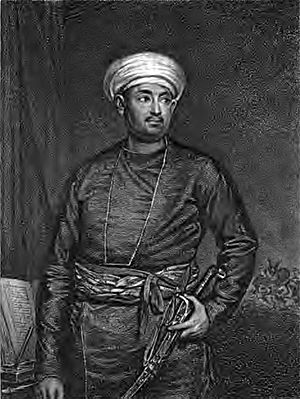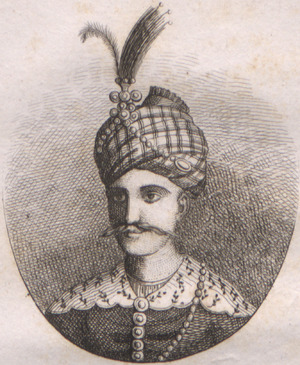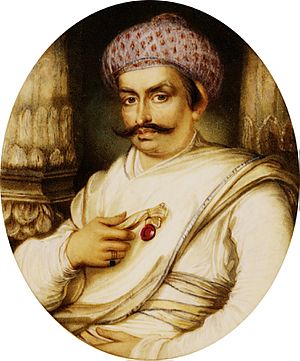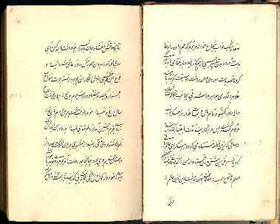Mirza Abu Taleb Khan facts for kids
Mirza Abu Taleb Khan (born 1752, died 1805 or 1806) was an important Indian tax collector and leader. He was known as The Persian Prince when he visited London. He wrote a famous book about his travels in Europe and Asia, called Masir Talib fi Bilad Afranji. This book is one of the first travel stories written by an Indian person about the Western world. It is considered a very important "reverse travelogue" from that time. He wrote all his books in the Persian language.
Contents
About Mirza Abu Taleb Khan
Most of what we know about Abu Taleb comes from his own writings. His father, Hajji Mohammed Beg, was from Persia but moved to Lucknow in northern India. He became a friend of Safdarjung, who was a powerful leader in the area called Oudh State.
Early Life in Oudh and Bengal
Abu Taleb was born in Lucknow in 1752. His father worked for the leader of Oudh. After Safdarjung died, his father had to leave. Abu Taleb and his mother stayed in Lucknow. The new leader made sure Abu Taleb received a very good education.
In 1766, they moved to Murshidabad in West Bengal. Sadly, his father died there in 1768. Abu Taleb later married into a powerful family and worked for the leader of Bengal for a while.
In 1775, he was invited back to Oudh to become an "Aumildar" for the Etawah district. This job meant he was a tax collector, a local leader, and a military controller all at once. But he lost this job after a couple of years when his boss died.
After a year without work, Abu Taleb started working for the East India Company. This company was very powerful in India. He helped Colonel Alexander Hanney, who was the company's tax collector. He did this for three years.
Later, the tax system in Oudh was in trouble. A local leader named Balbhadra Singh refused to pay taxes. Warren Hastings, the top British leader in India, asked Abu Taleb to help. Abu Taleb agreed and helped defeat Singh.
However, after Hastings left, Abu Taleb lost his main support. Another minister, Hyder Beg Khan, stopped Abu Taleb's yearly payment. This made Abu Taleb decide to move to Calcutta, where the East India Company's main government was.
He tried to get a job with the new British leader, Sir Charles Cornwallis. But Cornwallis was busy with a war. After the war, Cornwallis sent Abu Taleb back to Lucknow with letters of recommendation. But problems between the local leader and the British meant Abu Taleb couldn't get a job. He became unemployed and very sad.
Mirza Abu Taleb Khan's Grand Tour
In 1799, when Abu Taleb was feeling very low, he got an exciting offer. David Thomas Richardson, a British officer, asked him to travel to Europe with him. Abu Taleb quickly said yes! It's not fully clear if this was just a friendly offer or if the East India Company had a reason for him to travel. Some think the company wanted to invest in him for future use in India.
Khan and Richardson left Calcutta on February 7, 1799. They stopped in Cape Town, South Africa, for a few months. They were welcomed there and met important people. They then sailed to Ireland, arriving in December 1799.
In Ireland, Abu Taleb met Cornwallis again. He also met Sake Dean Mahomed, another Indian who had published a travel book. This book might have inspired Abu Taleb.
With letters of recommendation from Cornwallis, Abu Taleb traveled to London. He arrived on January 21, 1800, and stayed for a long time. He became very popular in London society and was known as The Persian Prince.
He met Charlotte of Mecklenburg-Strelitz, the Queen of King George III, and was often invited to court. Newspapers reported on his activities. He met many important people, including famous politicians and directors of the East India Company. He also enjoyed meeting the wives and daughters of his new friends.
Abu Taleb left England on June 7, 1802. He visited France, where he met scholars who studied Eastern cultures. He also received invitations to meet famous leaders like Napoleon, but he was too ill to go. He then traveled to Constantinople (modern-day Istanbul) and met the Sultan. From there, he traveled overland through Kurdistan and Persia, visiting important holy sites. He returned to Calcutta in August 1803. Some believe this part of his journey was to strengthen his Muslim identity for future plans.
After returning, Abu Taleb found work as an administrator in Bundelkhand. He spent his time writing his travel book, Masir Talib fi Bilad Afranji. He died shortly after, in 1805 or 1806.
Travels of Mirza Abu Taleb Khan
The title of his book, Masir Talib fi Bilad Afranji, means "The Travels of Taleb in the Regions of Europe." It also has a clever meaning, suggesting "the path of aspiration" or "the path of wishfulness." This shows the book is both a travel guide and a discussion about the deeper meaning of travel.
In his book, Abu Taleb explained that he wrote it to describe the "wonders he saw" for his fellow countrymen. He hoped that many of the "customs, inventions, sciences and rules of Europe" could be useful in Asia.
The book tells the story of his travels. It also has separate chapters on interesting topics like:
- Arts and sciences
- Inventions
- Lifestyles of different people
- Government systems
- The East India Company
- The justice system
- Money matters
- The good and bad qualities of the English people
- Europe's conflicts
- England's conquests overseas
Abu Taleb's book shows both his admiration and his criticism of the West. He was fascinated by Western engineering, factories, bridges, and shipyards. He understood how Europe's wealth was connected to its industrial revolution. He praised the hard work and efficiency of the English people, as well as their honesty and knowledge.
However, he also criticized the English for their lack of faith, pride, rudeness, and love for luxury. He often compared the East and West, sometimes suggesting that the East was better. For example, he thought the Muslims in Cape Town were kinder, and that ancient Indian temples were like Oxford. He also believed the Muslim justice system was better than the English jury system, which he found scary and often wrong. He noted that while the English claimed "equality for all" before the law, it seemed more like an appearance than reality.
Even with his criticisms, the British in India noticed and promoted Abu Taleb's book. A British scholar named Charles Stewart translated it into English in 1810. The British government even published the original Persian version. They believed it was a good idea to share such a book with the people of India. Abu Taleb's son, Mirza Hussein Ali, helped with the publication of the Persian versions.
Other Writings
Mirza Abu Taleb Khan also wrote other books, including:
- Lubbu-s Siyar wa Jahánnumá (The Essence of Biographies, and the World-Reflecting Mirror) around 1793-1794
- Masir Talib fi Bilad Afranji, (The Travels of Taleb in the Regions of Europe) around 1805
- Travels of Mirza Abu Taleb Khan in Asia, Africa and Europe published in 1810 and 1814
He also wrote other papers and a book about poets. He even wrote poems himself, especially about English women, whom he found very charming.
See also
- Tafazzul Husain Kashmiri
- Dean Mahomed
 | Dorothy Vaughan |
 | Charles Henry Turner |
 | Hildrus Poindexter |
 | Henry Cecil McBay |





